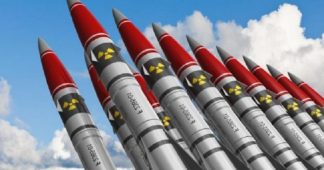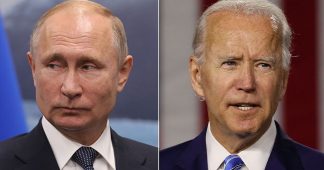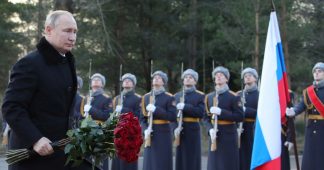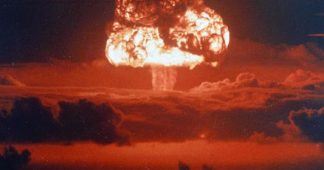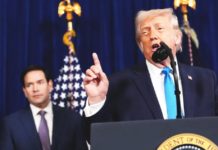By Scott Ritter*
16 Apr, 2021
Joe Biden has announced a new wave of sanctions against Russia and signalled the potential for more. Biden’s mouth is writing checks the US can’t cash, and his latest tantrum is likely the last gasp of failed anti-Russia strategy.
Back in the Cold War, the US and Soviet Union wore “big-boy pants” – they understood the realities of the world they lived in and accepted the consequences of their respective actions like adults. Espionage was a given; when you succeeded, you kept your mouth shut, and when you were caught, you took your lumps in silence. What underpinned this approach was the kind of begrudging respect that professionals of equal stature afford to one another – each side had a job to do, and they got on with it.
Both sides were engaged in active propaganda, some overt, much of it covert. This ideological combat was waged in the battlefield of the minds of intellectuals and activists, who were entrusted to decide for themselves which brand of idealism they would embrace. The CIA underwrote such notable literary journals such as The Paris Review and Encounter, while Soviet efforts to infiltrate the Black Civil Rights movement and the anti-war movement of the 1960’s are well documented. And yet, throughout this war of words, Kennedy somehow met with Khrushchev, Nixon and Carter with Brezhnev, and Reagan with Gorbachev. We opposed the Soviets, but we also respected them as worthy opponents.
This attitude changed, almost overnight, with the collapse of the Soviet Union at the end of 1991, and the end of the Cold War. The successor to the once mighty Soviet Union was the Russian Federation, which had been transformed from a world power capable of dictating global outcomes to a regional train wreck, in desperate need of foreign assistance to keep it from falling apart. Inside the CIA, the once all-powerful Office of Soviet Analysis (SOVA), the largest and most prestigious fiefdom within the Directorate of Intelligence, was dissolved, replaced by the more generic sounding “Office of Slavic and Eurasian analysis”, and later, the Office of Russian and European analysis. Old-time analysts who had spent decades studying the Soviet Union were dismissed or reassigned, replaced by a new breed, who viewed Russia not as an adversary to be respected, but a victim to be exploited.
Moscow Station – the CIA operation inside the Soviet Union – was likewise gutted, transforming overnight from the premier posting for the agency’s most capable case officers into a backwater where new officers were sent to cut their baby teeth and old officers to retire. The CIA’s approach to Russia in the 1990’s was one of negligent incompetence, where analysis was lazy and operations virtually non-existent. The demand for high quality intelligence simply did not exist in an environment where the Russian government, in the form of an alcoholic president named Boris Yeltsin, had completely subordinated himself to the will of his American masters, and the Russian national security establishment was more than happy to sell its secrets to anyone willing to pay a price.
As the old cadre of Soviet-era specialists were pushed to the side, they were replaced by a new breed of activist-analysts, people who viewed Russia as a laboratory for Western notions of democracy, and the Russian people as little more than guinea pigs to be experimented with. The buy-in to this approach to US-Russian relations was absolute, with little or no examination as to its wisdom, or its long-term viability in post-Soviet Russia. The “experts” that emerged during this time – personalities such as Michael McFaul, Anne Applebaum, Susan Glasser, Fiona Hill, and others – were intellectually lazy, if for no other reason than their theses went unchallenged.
The rise of Vladimir Putin took this universe of self-minted “new Russia” experts by storm – they literally did not know what hit them. Their buy-in into the artificial reality of Boris Yeltsin was so strong that these so-called experts had no real foundation upon which to assess the Putin phenomenon. Rather than seeing Putin’s rise as part of a natural reaction on the part of the Russian state and people to the abject failure of the Yeltsin years, these “experts” viewed Putin as an alien being, a foreign object which had intruded upon their exclusive playground and was disrupting their nation-building fantasies. Anti-Putin literature became par for the course, and these so-called Russian experts helped found a new school of Russian studies, where the Russian nation was simplified into the person of a single man, whose life and politics were simplified into a cartoon-like caricature far removed from reality.
* Scott Ritter is a former US Marine Corps intelligence officer and author of ‘SCORPION KING: America’s Suicidal Embrace of Nuclear Weapons from FDR to Trump.’ He served in the Soviet Union as an inspector implementing the INF Treaty, in General Schwarzkopf’s staff during the Gulf War, and from 1991-1998 as a UN weapons inspector. Follow him on Twitter @RealScottRitter
Published at www.rt.com
